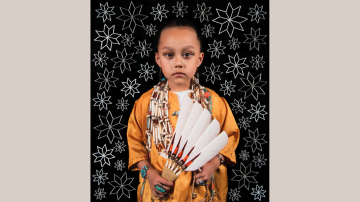Commitment to Indigenous Art and Artists
As part of Northwestern University, The Block is committed to supporting the University's work to strengthen its relationships with Native American and Indigenous nations, communities, and organizations. At The Block, we’re committed to deepening our relationship to Indigenous art and artists through our collection, exhibitions, programs, practices, and learning.
Northwestern University Land Acknowledgement

Northwestern is a community of learners situated within a network of historical and contemporary relationships with Native American tribes, communities, parents, students, and alumni. It is also in close proximity to an urban Native American community in Chicago and near several tribes in the Midwest. The Northwestern campus sits on the traditional homelands of the people of the Council of Three Fires, the Ojibwe, Potawatomi, and Odawa as well as the Menominee, Miami and Ho-Chunk nations. It was also a site of trade, travel, gathering and healing for more than a dozen other Native tribes and is still home to over 100,000 tribal members in the state of Illinois.
It is within Northwestern's responsibility as an academic institution to disseminate knowledge about Native peoples and the institution's history with them. Consistent with the University's commitment to diversity and inclusion, Northwestern works towards building relationships with Native American communities through academic pursuits, partnerships, historical recognitions, community service and enrollment efforts.
Learn more
Center for Native American and Indigenous Research (CNAIR)
CNAIR is Northwestern University’s primary institutional space dedicated to advancing scholarship, teaching, learning, and artistic or cultural practices related to Native American and Indigenous communities, priorities, histories, and lifeways. The Block is proud to collaborate with CNAIR on an ongoing basis to identify mutual strategic alignments and potential shared infrastructures that impact teaching, learning, and scholarship.
Learn more about CNAIR
Block Initiatives
As part of Northwestern University, The Block is committed to supporting the University's work to strengthen its relationships with Native American and Indigenous nations, communities, and organizations. At The Block, we’re committed to deepening our relationship to Indigenous art and artists through our collection, exhibitions, programs, practices, and learning.

The Collection
The Block is committed to acquiring work by Indigenous artists, with a special focus on Contemporary artists who have a connection to the region (artists who are Chicago/Evanston-based, or from nations with current or ancestral ties to the Great Lakes: Ojibwe; Odawa; Potawotami; Ho-Chunk; Menomonie; Myaamia). The collection does not contain any historical cultural material.

Exhibitions and Programs
The Block is committed to regularly supporting the work of Indigenous artists through collaboration and partnership in exhibitions, cinema screenings, public programs, and in-depth engagements.

Staff Learning
The Museum's Collection and Exhibitions team is committed to researching the care of Native American and Indigenous contemporary artworks and creating a network of regional and national experts whom consult about handling and care practices. As a staff, we are also engaged in long-term learning about the Indigenous histories that shape our region and connect to our present.

Teaching
The Block partners closely with Northwestern faculty to integrate works by Indigenous artists into teaching in our galleries and onsite classroom. These collaborations give students the opportunity to engage directly with original artworks, fostering meaningful encounters with Indigenous art and artists as part of their academic experience.




